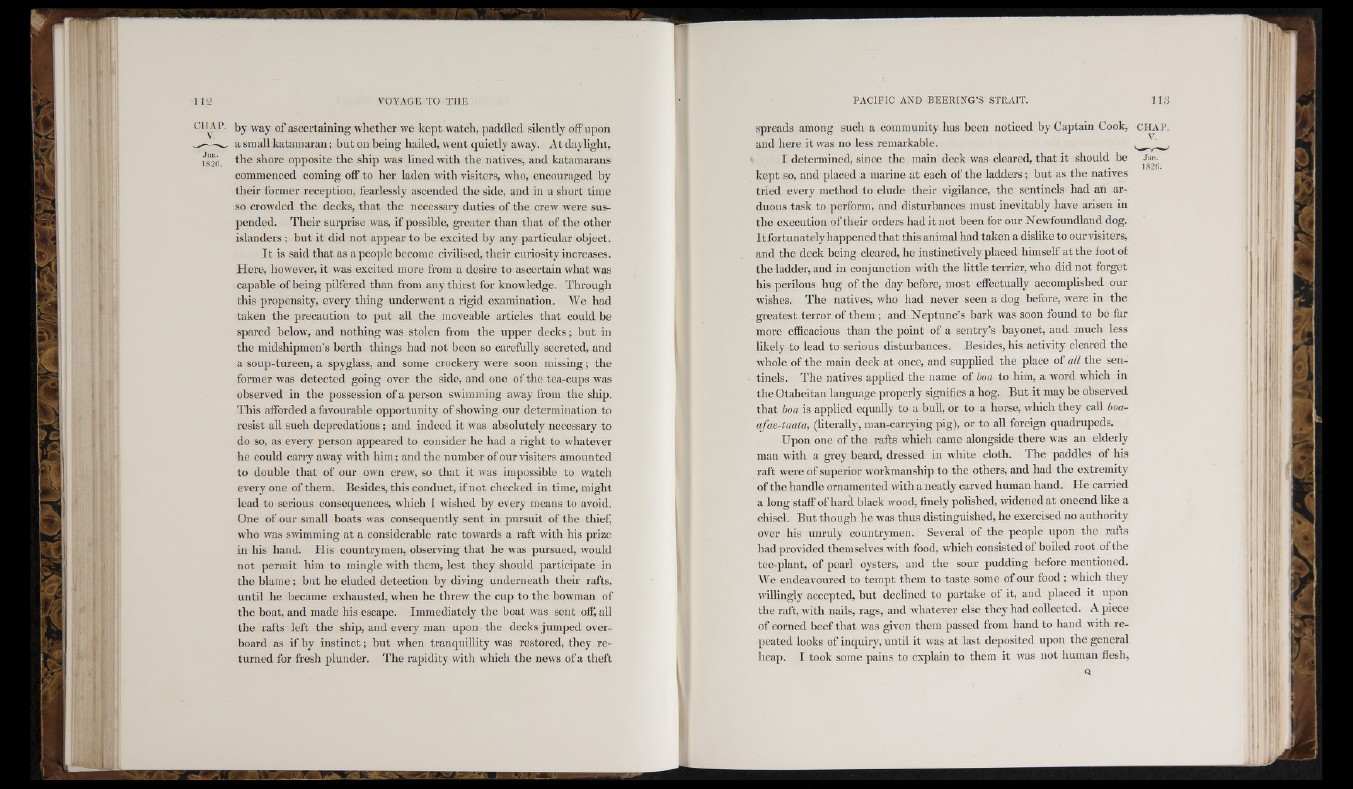
CMAP.
V.
Jan .
182{).
' I
by way of ascertaining whether we kept watch, paddled silently off* upon
a small katamaran; hut on being hailed, went quietly away. At daylight,
the shore opposite the ship was lined with the natives, and katamarans
commenced coming off* to her laden with visiters, who, encouraged by
their former reception, fearlessly ascended the side, and in a short time
so crowded the decks, that the necessary duties of the crew were suspended.
Their surprise was, if possible, greater than that of the other
islanders ; but it did not appear to be excited by any particular object.
I t is said that as a people become civilised, their curiosity increases.
Here, however, it was excited more from a desire to ascertain what was
capable ofbeing pilfered than from any thirst for knowledge. Through
this propensity, every thing underwent a rigid examination. We had
taken the precaution to put all the moveable articles that could be
spared below, and nothing was stolen from the upper decks; but in
the midshipmen's berth things had not been so carefully secreted, and
a soup-tureen, a spyglass, and some crockery were soon missing; the
former was detected going over the side, and one of the tea-cups was
observed in the possession of a person swimming away from the ship.
This afforded a favourable opportunity of showing our determination to
resist all such depredations; and indeed it was absolutely necessary to
do so, as every person appeared to consider he had a right to whatever
he could carry away with him; and the number of our visiters amounted
to double that of our own crew, so that it was impossible to watch
every one of them. Besides, this conduct, if not checked in time, might
lead to serious consequences, which 1 wished by every means to avoid.
One of our small boats was consequently sent in pursuit of the thief,
who was swimming at a considerable rate towards a raft with his prize
in his hand. His countrymen, observing that he was pursued, would
not permit him to mingle with them, lest they should participate in
the blame; but he eluded detection by diving underneath their rafts,
until he became exhausted, when he threw the cu}) to the bowman of
the boat, and made his escape. Immediately tlie boat was sent offj all
the rafts left the ship, and every man upon the decks jumped overboard
as if by instinct; but when tranquillity was restored, they returned
for fresh plunder. The rapidity with which the news of a theft
I ¿A.
spreads among such a community has been noticed by Captain Cook,
and here it was no less remarkable.
I determined, since the main deck was cleared, that it should be
kept so, and placed a marine at each of the ladders; but as the natives
tried every method to elude their vigilance, the sentinels had an arduous
task to perform, and disturbances must inevitably have arisen in
the execution of their orders had it not been for our Newfoundland dog.
It fortunately happened that this animal had taken a dislike to our visiters,
and the deck being cleared, he instinctively placed himself at the foot of
tlie ladder, and in conjunction with the little terrier, who did not forget
his perilous hug of the day before, most effectually accomplished our
wishes. The natives, who had never seen a dog before, were in the
greatest terror of them ; and Neptune’s bark was soon found to be far
more efficacious than the point of a sentry’s bayonet, and much less
likely to lead to serious disturbances. Besides, his activity cleared the
whole of the main deck at once, and supplied the place of all the sentinels.
The natives applied the name of boa to him, a word which in
the Otaheitan language properly signifies a hog. But it may be observed
that boa is applied equally to a bull, or to a horse, which they call boa-
afae-taata, (literally, man-carrying pig), or to all foreign quadrupeds.
Upon one of the rafts which came alongside there was an elderly
man with a grey beard, dressed in white cloth. The paddles of his
raft were of superior workmanship to the others, and had the extremity
of the handle ornamented with a neatly carved human hand. He carried
a long staff* of hard black wood, finely polished, widenedat oneend like a
chisel. But though he was thus distinguished, he exercised no authority
over his unruly countrymen. Several of the people upon tlie rafts
had provided themselves with food, which consisted of boiled root of the
tee-plant, of pearl oysters, and the sour pudding before mentioned.
We endeavoured to tempt them to taste some of our food; which they
willingly accepted, but declined to partake of it, and placed it upon
the raft, with nails, rags, and whatever else they had collected. A piece
of corned beef tliat was given them passed from hand to hand with repeated
looks of inquiry, until it was at last deposited upon the general
heap. I took some pains to explain to them it was not human flesh,
(i
1:! ; I ! !|
!lii
} 'f
; III
I'
'h
ii
| ]
II
r M
-I*
I'!!:
Mill'